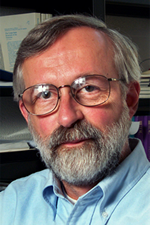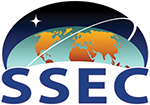University Honors Scientist for Excellence in Service
MADISON, WI, April 8, 2001—Senior scientist Wilton Sanders has been awarded this year’s Chancellor’s Award for Excellence in Service to the University. Seven academic staff professionals in a variety of roles were honored for excellence this year. Sanders is one of four to receive a Chancellor’s Award, the only one for university service.
 Sanders is an astrophysicist who has spent his professional career as an academic staff scientist in the University of Wisconsin–Madison in both the Department of Physics and the Space Science and Engineering Center. His colleagues say they could as easily have honored him for his excellent research. He has been involved in the university’s respected X-ray astronomy program since 1971, starting with the sounding rocket program in cosmic X-ray Physics. His research has included both work on instruments built at SSEC as the Orbiting Solar Observatory-8 soft X-ray experiment and the Diffuse X-ray Spectrometer experiment, as well as guest observations using the Einstein satellite, the Chandra X-ray Observatory and others. Sanders was elected a fellow of the American Physical Society in 1993. He has written numerous publications, alone and with others.
Sanders is an astrophysicist who has spent his professional career as an academic staff scientist in the University of Wisconsin–Madison in both the Department of Physics and the Space Science and Engineering Center. His colleagues say they could as easily have honored him for his excellent research. He has been involved in the university’s respected X-ray astronomy program since 1971, starting with the sounding rocket program in cosmic X-ray Physics. His research has included both work on instruments built at SSEC as the Orbiting Solar Observatory-8 soft X-ray experiment and the Diffuse X-ray Spectrometer experiment, as well as guest observations using the Einstein satellite, the Chandra X-ray Observatory and others. Sanders was elected a fellow of the American Physical Society in 1993. He has written numerous publications, alone and with others.
As enthusiastically as he pursued his research, Sanders has sought recognition for academic staff as full partners with faculty in governing the university. He has been active in university service since his first term on the Academic Staff Assembly, shortly after it was formed, in 1989. Some of his many contributions as a committee member are:
While he served, the Graduate School’s Principal Investigators Committee gave permanent PI status to individual academic staff scientists. Before this (about 1993), an academic staff scientist needed to be approved each time he or she wanted to propose a research project.
He served on several search committees, including those which selected Graduate School Dean Virginia Hinshaw; DoIt’s Chief Information Officer Ann Stunden; and the College of Agricultural and Life Sciences Dean and Director, Elton Aberle.
He served on the Sweatshop Issues Committee and, with three colleagues, he represented UW–Madison at the founding conference of the Worker Rights Consortium.
In August 2000, UW–Madison’s academic staff elected Sanders to lead the Academic Staff Executive Committee, where he recommended budgeted professorial titles as a way to more accurately reflect the responsibilities, credentials and work expectations of career instructional and research academic staff. According to Colleen McCabe, secretary of the Academic Staff, Sanders “worked tirelessly to advocate for these titles,” promoting their professional benefits for academic staff. Although disapproved by the faculty senate, current ASEC chair Linda Newman hopes the titles can be approved eventually.
When pressed for his philosophy of service, Sanders said, “[one should] be aware when there are opportunities to push things in the right direction, to make some small difference for the institution.” To that end, Sanders has not only worked to build consensus and encouraged participation in the governance process.
He also has said, “A little help can go a long way, especially if everyone helps.” It’s no surprise he has served as mentor to five new academic staff scientists in the Academic Staff Mentoring Program begun in 1997. Physicist John Sarff, a member of Sanders’ nominating committee, said that he was a “mentor for all academic staff. …[he has the] patience for the difficult challenge of initiating the communication it takes to build an environment that maximizes academic staff potential and job satisfaction.”
This year’s award winners will be honored at a chancellor’s reception on Tuesday, April 16.
For more information, contact SSEC’s Public Information Officer, 608-263-3373.
